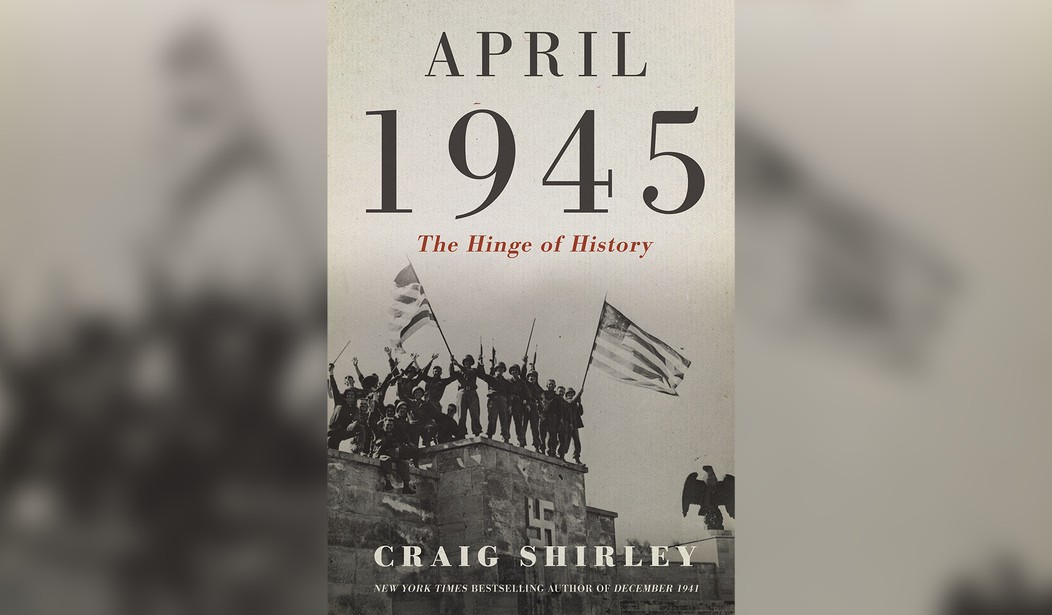On Feb. 22, presidential historian Craig Shirley’s latest book, “April 1945: The Hinge of History” hit the stands. The book is a follow up to Shirley’s highly acclaimed “December 1941: 31 Days that Changed America and Saved the World,” which came out in November 2011. As “December 1941” detailed the events that unfolded when America entered the Second World War, “April 1945” gives insight into the months leading up to the country’s exit from the war, with April being the most pivotal. This is Shirley’s latest book since “Mary Ball Washington” in 2019. He has also written four critically acclaimed books on the late President Ronald Reagan.
In “April 1945,” Shirley opens each chapter of the book beginning with a different month leading up to April with the epilogue spanning several subsequent months up to August. The start of each chapter includes headlines from renowned newspapers’ coverage of the war. This format helps the pacing of the story and structures the different events that were occurring across the globe simultaneously – including Washington, D.C., London, and Nazi Germany.
Zeroing in on April, specifically, Shirley explains in detail the several monumental events that occurred in this month that altered the course of WWII and “led to the birth of a brand new world.” One specific event Shirley discusses is the transition from President Franklin D. Roosevelt to President Harry Truman, which occurred on April 12, 1945 when Roosevelt died in office. Shirley describes Roosevelt's health deterioration in length in the months leading up to his death. At the time of his death, Roosevelt was three months into his fourth term as president, the only president to break President George Washington’s two-term observance. The day before, April 11, 1945, American troops liberated Buchenwald, one of the Nazi’s first concentration camps that opened in July 1937.
Later that same month, Shirley writes how Italian dictator Benito Mussolini and his mistress were shot dead as they tried to escape to Switzerland. Two days later, on April 30, Adolf Hitler and his wife Eva, who he had married the day before, committed suicide. Germany surrendered a week later on May 7.
Recommended
Shirley includes how Americans on the home front respond to the turning of events in the months leading up to the end of the war. Each chapter is chock-full of the current happenings in American culture, from fashion to movies, and how the nation “emerged from World War II as a leading superpower.” The events, big and small, from across the world, are shown from every angle.
In a Q&A, Shirley discussed with Townhall his writing process for “April 1945,” how he conducted research, and what books readers can expect from him next.
Townhall: You’ve authored numerous books on President Ronald Reagan and released your highly acclaimed December 1941, in 2011, detailing America’s entrance into WWII. What inspired you to write April 1945 as the follow-up to December 1941?
Craig Shirley: As I began to conduct research for December, 1941, I began to discover how fascinating a month April, 1945 was. It is the closing of the war, but there is so much going on. FDR dies suddenly and that in of itself was earth shaking. But then Hitler commits suicide, then Mussolini and his mistress are rudely taken down by the mob, Auschwitz and all its horrors are discovered, as is Dachau, the battle for Okinawa is blazing. Remember, the atomic bomb has yet to be invented, so Okinawa was to be the final staging island for the final invasion of Japan.
TH: How did you conduct research for April 1945?
CS: Library of Congress, online, personal letters and diaries, books, newspapers and magazines, military documents. It was comprehensive. I get dismayed over all the research left behind or missing. I also found material at the FDR Library and the Truman Library. I also have in my personal possession the medical records of Dwight Eisenhower. They were given to me by the son of Ike’s personal physician, Dick Snyder.
TH: During your research, did you learn anything new about America’s involvement in WWII?
CS: A lot big and small. For instance, I did not know Bill Buckley was then in the army and a part of the honor guard for FDR’s funeral. Or that from Bob Dole’s book that soldiers were weeping in their foxholes when they learned of FDR’s passing. Or that FDR did not lay in state in the Rotunda of the US Capitol as many other presidents have. I also learned that the national speed limit was 35 miles per hour. Or that one fourth of all vegetables grown in America in 1944 were grown in Victory Gardens; on top of tenements, in backyards.
TH: What did the writing process look like for you for April 1945? How was it different from your books on President Reagan?
CS: The big difference was there were still a lot of people to talk to with the Reagan books. And old documents were more easily found at presidential libraries such as the Reagan Library, the FDR Library.
TH: What do you hope readers take away from April 1945?
CS: How important it was as a month to Americans. How it went from an isolation country to an internationalist country. How we went from a mediocre power to a superpower. How the institution of the presidency changed radically from a really small operation to essentially leader of the free world. A lot of things, serious, and a few things fun.
TH: Can you tell Townhall what you’re working on next?
CS: I am working on two more books on Reagan and one book on Trump. Then, I plan on taking my sailboat to Belize for a year or two to relax and soak up the sun and think about more books. Actually, I have a list written on a yellow table but I am afraid my list is going to last longer than I will.

























Join the conversation as a VIP Member